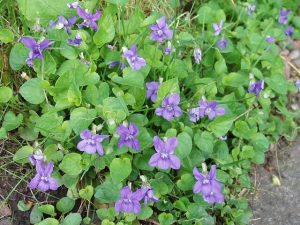BOTANICAL NAME: Viola odorata
FAMILY: Violaceae
ENGLISH NAME: Wood violet
COMMON NAME:
Punjabi: Banafsha
Hindi: Banaphsha

HABITAT: Shrubberies, forest clearings, rocky and shady areas; mud walls.
BOTANICAL DESCRIPTION: Perennial herb with stout creeping rootstock. Leaves are radical, upto 3 cm diam., petiolate, stipules elongated, and leafy. Flowers pinkish-blue or purplish, with long pedicels. Capsule 3-sided. Flowering is from February to April
AYURVEDIC PROPERTIES:
| RASA | GUNA | VEERYA | VIPAKA | PRABHAVA | DOSHGHNTA |
| Katu
Tikta |
Laghu
Snigdha |
Ushna | Katu | – | Vata Pittahara |
AYURVEDIC ENERGETICS:
| TASTE | PROPERTY | POTENCY | POST DIGESTION EFFECT | ACTION | DOSHA ACTION |
| Pungent, Bitter | Light, Unctuous | Hot | Pungent | – | Vata Pitta Pacifying |
MAJOR CHEMICAL CONSTITUENTS: glycoside-methyl salicylate, methyl salicylate
THERAPEUTIC USES:
- Burns: Leaves paste is to be applied externally
- Headache: Flowers and leaves decoction is to be administered
- Urinary diseases: Seed powder is to be used
- Cough: Decoction is to be prepared with its flowers
INDICATIONS:
Shiro shoola Headache, Kasa Cough, Jwara Fever
USEFUL PART: Flower, whole plant
DOSAGE: Powder 3-6gm
AYURVEDIC FORMULATION:
Banafshadi kwath
